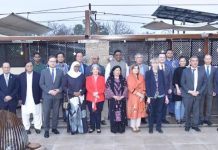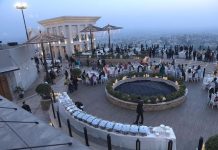ISLAMABAD, NOV 10 /DNA/ – The 10th Islamabad Literature Festival (ILF), ‘Words Change Mindsets,’ comprising fifty intellectually inspired sessions, including movie screening, dance recital, mushairas, theatre, and a memorable Sufi night, concluded with a fantastic closing ceremony at the Allama Iqbal Auditorium last evening. The event was graced by 100+ prominent voices in literature and art who spoke and reflected as keynotes and panelists in the festival, and esteemed guests.
Commenting on the transformative character of such events, renowned writer, and critic Muneeza Shamsie shared, “ILF has shown us the unifying power of words, fostering dialogue across divides and inspiring change.” Poet and writer Najeeba Arif echoed the sentiment, adding, “Literature shapes our perspectives and allows us to see the world through others’ eyes.”
The event also featured remarks by Mohammad Mikail Soomro, Head of Corporate Communications, Getz Pharma, who emphasized the value of supporting literary platforms, saying, “We are proud to be part of an initiative that encourages intellectual discourse and nurtures Pakistan’s vibrant literary culture.
Arshad Saeed Husain, Managing Director, Oxford University Press Pakistan, expressed his gratitude to attendees and contributors, stating, “Our passion and commitment is towards ensuring that Literature continues to drive the change towards a progressive and equitable society. We are blessed to have found an ever-expanding group of friends like you to empower our mission.”
Bringing up the last five of the total seventeen book launches; Day 3, continued with Akbar in Wonderland by Umber Khairi. In a lively conversation between the author and Aamir Ghauri, Khairi shared insights on her protagonist’s challenges of social and political ethos in the nineties.
In the Urdu fiction category, Najeeba Arif’s Mazahir o Mubahis was presented, in conversation with Abid Hussain Sial, who explored the themes of cultural identity and modernity. Shahid Siddiqui’s latest work, Toronto, Dubai, and Manchester, was discussed in a session with Asghar Nadeem Syed, highlighting Siddiqui’s narrative journey through the socio-political landscapes of three cities.
M. Athar Tahir’s Telling Twilight offered a poetic exploration of nature and nostalgia, with Tahir discussing his work with filmmaker Ammar Aziz. Similarly, Pani pe likhi kahani by Muhammad Asim Butt was launched in an engaging discussion with Qasim Yaqoob, delving into Butt’s reflections on time and memory.
A heartfelt session was held for My Friend Mairaj: An Intimate Biography by Shamim Ahmad, who, in conversation with Safiya Aftab, spoke on the legacy and personal memories of Mairaj Muhammad Khan. In a session filled with introspection and personal insights, Aankh se Aasman jata hai by Tariq Naeem, was launched, with Mehboob Zafar moderating a conversation on Naeem’s unique poetic vision.
The festival also celebrated English poetry with the launch of Poetry in English from Pakistan, edited by Ilona Yusuf and Shafiq Naz. A diverse panel of poets, including Naeem Pasha, Rayan Khan, Alamgir Hashmi, Harris Khalique, Waqas Naeem, Haseeb Sultan, Wajahat Malik, Athar Tahir, Mehvash Amin, Saad Ali, Zain Ul Abidin Khan Alizai, and Sophia Bano, presented their works, with Ammar Aziz moderating a discussion that highlighted the rich tapestry of Pakistan’s English-language poetry scene.
An engaging lineup of panel discussions and sessions sparked lively conversations on diverse topics relevant to Pakistan’s socio-cultural and literary landscape. Season 2 of Capital Talk featured a thought-provoking conversation between Hamid Mir and Meher Bukhari, touching on pressing issues in journalism and public discourse. In a timely discussion on social media: Free Speech vs. Censorship, panelists Farnood Alam, Husnain Jamal, and Munizae Jahangir, moderated by Khayyam Mushir, delved into the challenges of balancing freedom of expression with the need for responsible content regulation. Munizae spoke of the pains of fighting fake news but insisted that censorship must change its role towards protecting the rights of the minorities and not suppressing the voice of people.
Visual Journey: Documenting The National Art Gallery of Pakistan; moderated by Hammad Husain, the session delved into insights regarding preserving Pakistan’s heritage. Naeem Pasha’s philosophy of humility and accessibility in designing his masterpiece won hearts. “Sango Khesht has to be subservient to Art and Culture.”
A literary discussion, Pakistani Urdu Adab ke Khud-o-Khaal, brought together esteemed voices like Zehra Nigah, Iftikhar Arif, Najeeba Arif, and Abid Hussain Sial, moderated by Shakeel Jazib, to explore the evolving identity of Urdu literature in Pakistan. On the question of geography of literature, Zehra Nigah commented, “Literary molds evolve with time to stay relevant – very much like the physical structures. Literature has never had boundaries, and it will stay connected to its historical legacy while reflecting present dynamics.” Arif Iftikhar expanded on how rich Pakistani literature has been with stalwarts like Ibne Insha. Yusufi, Rashid, Pitras, Faiz, and countless more, and how their works are gems of the glorious history and literary wonders of Urdu language.
The session Urban Dialogues: Decoding Islamabad’s Dynamics with Naeem Pasha, Fauzia Asad Khan, Sikander Ajam Khan, and Hammad Husain, moderated by Hamid M. Husain, examined Islamabad’s urban growth and social shifts. Theater group Swaang performed Daastan-e-Mizaah, adding a cultural touch to the festival through a comedic exploration of Pakistani society.
In Fostering a Global Mindset: Co-Existence of Local and International Exam Boards, panelists including Ghulam Ali Mallah, Amanda Ingram, Andrew Coombe, Arshad Saeed Husain, and Shahid Soroya, moderated by Faisal Bari, debated the merits of a diversified educational approach. Shahid spoke of the learning crises of fifty-four million children in school, while Coombe defined the essence of curiosity that must define pedagogical and assessment’s objective. Pakistani English Literature: Defining a Canon featured Muneeza Shamsie, Harris Khalique, and Ilona Yusuf, guided by Aroosa Kanwal, discussing the evolution of English literature from Pakistan and the challenges in forming a literary canon. Commenting on the nature of literary festivals, Harris Khalique said,” festivals may not contribute to the literary canon, but they definitely enable the shift in the mindset.”
Hameed Akhtar’s legacy was revisited in Hameed Akhtar ke Sawaal with Iftikhar Arif, Saba Hamid, Asghar Nadeem Syed, and Harris Khalique, led by Shahzad Sharjeel. Exploring the economic opportunities via strengthening the AI infrastructure became the main discussion point in How Pakistan can capture its share of the $2 Trillion AI Market. It saw insights from Faisal Aftab, Owais Barlas, Fizza Amjad and was moderated by Basit Riaz Shaikh. In Who Owns the English Language? Contemporary Pakistani Anglophone Fiction – Raazia Sajid, Umber Khairi, and Sonia Irum, shared their views on Pakistani writers’ contributions to Anglophone literature. The session was moderated by Aroosa Kanwal.
The constitutional discourse in We the People and our Constitution, featuring Hamid Khan, Ahmer Bilal Soofi, and Farhatullah Babar, with Mujahid Barelvi as moderator, delved into citizens’ rights and constitutional awareness. Our Education System and the Future Workforce Needs, with experts A.H. Nayyar, Faisal Mushtaq, Shahid Siddiqui, and Shoaiba Mansoor, moderated by Faisal Bari, focused on aligning education with workforce demands. Shoaiba shared the update on vocational and technical integration in the federal schools, but all panelists agreed on the need for a paradigm shift with strong training, and evaluative framework for the teachers.
A session on digital storytelling, Beyond the Hype: Content Creators Crafting Stories, included creators Huzaifa Nizam (Huztory by Huzaifa), Noman Jaffar (Islamabadwala), and Maryam Raja, moderated by Sonia Irum, exploring the influence of digital narratives. Concluding with Pindi Afsanay ka School, Hameed Shahid, Ravish Nadim, and Nilofar Iqbal, moderated by Khaleeq ur Rehman, reflected on the unique narrative style emerging from Pindi’s literary scene.
The ceremony concluded with a soulful Sufi night performance by Akbar Ali Khan, leaving the audience deeply moved and inspired. The festival’s closing celebrated literature’s unique ability to reshape perspectives, fostering greater understanding and empathy across society.
About Oxford University Press
Oxford University Press (OUP) is a branch of the University of Oxford, dedicated to global publishing for various audiences. They produce dictionaries, educational materials, children’s books, journals, and more. With roots dating back to 1478, OUP received printing rights in 1586, extended to cover all book types in 1636. The Press is overseen by Delegates from the university’s faculty who approve proposals and work closely with editors. The Chief Executive, also known as the Secretary to the Delegates, manages OUP’s operations. Presently, OUP operates in 50+ countries, publishing in 90+ languages, making it the largest university press globally.

















